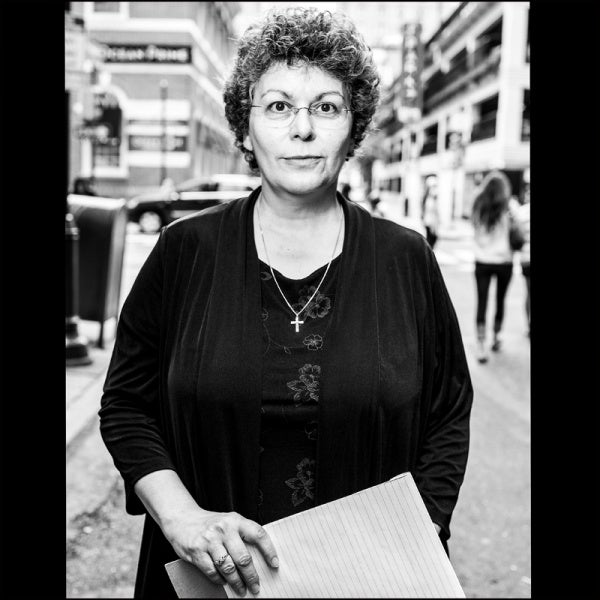Prostitution often grows from a life filled with trauma
-

Philadelphia police patrol a stretch of Kensington Avenue. Since January, police have made 633 prostitution arrests. (Photography by Jeff Fusco)
-

-

Philadelphia police made 633 prostitution arrests in the first half of this year. Street prostitution and drug addiction tend to go hand in hand, but many prostitutes who get busted and put in mandatory drug treatment end up back on the streets. Experts say that for better results, treatment has to address another important part of the puzzle: sustained trauma that often started in childhood.
Tracing the roots of addiction, prostitution
Several police officers were walking along a notorious stretch of Kensington Avenue on a recent afternoon. Despite their presence, drugs changed hands in broad daylight. Then as the sun sank, more women joined the street hustle, one of them so high she could barely stand. People streamed past her as if she were a ghost.
For many women, the path that brought them here started not with the first high or the subsequent craving for more drugs. It started long before that.
“One day I walked in the house, I was 7 or 8, and I saw my dad put a belt around my mom’s arm,” recalled a Philadelphia woman named Tracey. “She was shooting something—meth, heroin, whatever.” Tracey is in her 20s and has a daughter. She said when she was a kid she never knew stability or safety. “My mom she was always in and out. She used to ride around with the Pagans, shooting heroin. My sister was born in Muncie prison.”
Tracey’s childhood was spent in and out of foster care. She started to get into trouble early on, cutting school and having sex at the age of 9. “It was hard,” Tracey said. “Why I did it—I just wanted to feel good.”
Looking for love, finding near-death experiences
By the time she was 18, Tracey was doing drugs and needed a way to pay for them. “We were selling our bodies, prostituting, for the next run—just to smoke, to get high, to feel good. We needed love and we were looking for love in all the wrong places,” Tracey said.
Tracey’s drug of choice was PCP, also known as wet or angel dust. It has a dissociative effect. The cycle of getting high and selling sex to get high again brought more trauma and violence into Tracey’s life. One time, two men she had sex with left her for dead, still high on drugs. “I was up a block with all these garbage disposal trucks,” Tracey recalled. “Two crackheads found me, and they took me to their house until I came out of my coma.”
The traditional thinking about women like Tracey is if they beat their addiction and don’t need a constant stream of money to buy drugs, they could leave the streets and put their lives back together.
Philadelphia Public Defender Mary DeFusco found out that wasn’t true.
What’s beneath the tip of the iceberg?
“It wasn’t until I represented some women who did not yet have a drug addiction that I realized that this was an issue beyond drug addiction,” DeFusco said. “Drug addiction was only the tip of the iceberg that we could all see, and since we were all dealing with just the tip, we weren’t having a real effect on the whole thing.”
Many experts agree that the “iceberg” hidden beneath a mess of sex and drugs is trauma, which needs to be addressed for these women to have a chance of beating addiction.
“A large majority of our clients have symptoms that would qualify as PTSD diagnosis,” agreed Colette Green, the director of Chances, a women-only drug-treatment center in Philadelphia. Chances puts trauma front and center in its treatment approach. “Before treatment, many of them used drugs or alcohol to deal with the symptoms,” Green added.
Understanding the toxic effects of sustained trauma
The type of post-traumatic stress disorder the women at Chances often have is similar to what some combat veterans experience, said PTSD researcher and psychiatrist Frank Ochberg. It’s called “complex PTSD.” Basically, PTSD is when a person is mentally stuck reliving one life-defining traumatic event. Complex PTSD is when a person’s life is a series of adaptations to a stream of traumatic events.
“It’s a life of degradation, fear. You gradually get habituated to it,” explained Ochberg, a professor of psychiatry at Michigan State University. “You develop coping mechanisms, and before you know it, you’re a person who is not well adapted to normal civilian life.”
For those with complex PTSD, leaving a chaotic and dangerous environment is often more difficult than staying in it. They find facing violence easier than facing family. The disorder can rewire a victim’s brain, making recovering from drug addiction much harder than it normally is.
Finding a new path
Treatment at Chances involves a careful unraveling of clients’ trauma histories in one-on-one and group sessions. “During the weeks of treatment in the program, they learn about coping skills, how to deal with the trauma they experienced,” Green explained. “They have different topics: What does it mean to be a woman, healthy sexuality, also coping skills, mindfulness, self-soothing, relaxation, using support systems, and talking about the trauma.”
Talking about past traumas, Green said, helps clients put their experience into perspective in addition to negating its long-term scars.
Trauma-informed care is gaining ground in mental health treatment in general. Several organizations in Philadelphia, such as the Interim House, use this approach in addiction treatment. Project Dawn Court, a problem-solving court co-founded by public defender Mary DeFusco, helps to get women into these programs.
Tracey, the young Philadelphia mother, is now in treatment at Chances and says the fog is lifting—she sees a way out of the cycle.
“I don’t want to wake up every morning and smoke PCP and sleep all day while my daughter is out playing by herself. I don’t want to do that because I know I was doing that when I was growing up.”
This report is part of a multi-media mental health journalism series made possible by the Scattergood Foundation. For this project, Tara Murtha and reporting partner Randy LoBasso also wrote a cover story for the Philadelphia Weekly, coming out this week.
WHYY is your source for fact-based, in-depth journalism and information. As a nonprofit organization, we rely on financial support from readers like you. Please give today.

